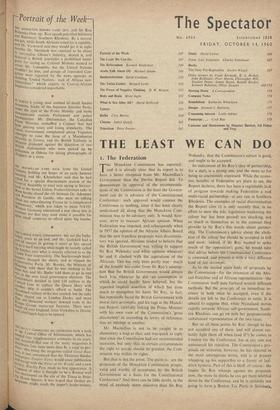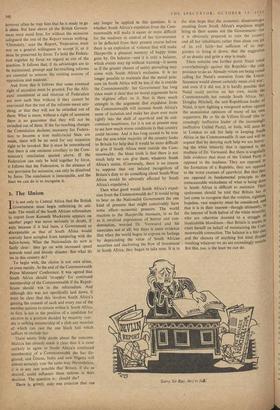THE LEAST WE CAN DO
I. The Federation
FTIHE Monckton Commission has reported:. I and it is already clear that its report is to have a better reception from Mr. Macmillan's Government than the Devlin Report did. To demonstrate its approval of the recommenda- tions of the Commission is the least the Govern- ment can do in advance of the Constitutional Conference: such approval would commit the Conference to nothing, since it has been clearly understood all along that the Monckton Com- mission was to be advisory only. It would, how- ever, serve to reassure African opinion. When Federation was imposed, and subsequently when in 1957 the opinion of the African Affairs Board that the new franchise proposals were discrimina- tory was ignored, Africans tended to believe that the British Government was willing to, support Sir Roy Welensky and White opinion whenever he and it clashed with the aspirations of the Africans. This has only been partly true: much of the trouble has come from Sir Roy's assump- tion that the British Government. would always back him whatever he did—an assumption in which he could hardly have believed, but the repeated implicit assertion of which has done much to strengthen his hand. Sir Roy, in fact, has repeatedly faced the British Government with moral faits accomplis, and his rage at the Monck- ton Report, carefully linking the Prime Minister with his own view of the Commission's 'gross discourtesy' in exceeding its terms of .reference, was an attempt at another.
Mr. Macmillan is not to be caught in as elementary a trap as that, and was quick to reply that since the Commission had not recommended secession, but only that in certain circumstances the right to secede should be granted, the Com- mission was within its rights.
But that is not the point. The point is: are the proposals of the Monckton Commission proper, valid and worthy of acceptance by the British Government as a basis for the Constitutional Conference? And there can be little doubt, in the mind of anybody more objective than Sir Roy Welensky, that the Commission's advice is good, and ought to be accepted.
Its indictment of Sir Roy's idea of partnership, for a start, is a strong one, and the more so for being so courteously expressed. While the econo- mic benefits of Federation are plain to see, the Report declares, there has been a regrettable lack of progress towards making Federation a real multi-racial partnership—at any rate in Southern Rhodesia. The examples of racial discrimination the Report cites (it is only recently that, in an effort to stem the tide, legislation weakening the colour bar has been passed) are shocking, not so much in themselves as' in the contrast they provide to Sir Roy's fine words about partner- ship. The Commission's advice about the aboli- tion of the colour bar should be accepted in full and soon: indeed, if Sir Roy wanted to spike much of the opposition's guns, he would take that advice before the Constitutional Conference is convened, and present it with a very different kind of fait accompli.
As to the second main body of proposals by the Commission—for the extension of the Afri- can franchise and of African representation—the Commission itself puts forward several different methods. But the principle of an immediate in- crease in both must be accepted, even if the details are left to the Conference to settle. It is absurd to suppose that, while Nyasaland moves rapidly towards African self-government, South- ern Rhodesia can go on with her preposterously unbalanced representation of the two races.
But on all these points Sir Roy, though he has not accepted any of them, and will almost cer- tainly fight them all when (and if?) he comes to London for the Conference, has at any rate not announced his rejection. The Commission's pro- posals on secession, however, he has rejected in
the most intemperate terms, and is at present whipping up his supporters to a frenzy of Iasi--
ditch hysteria. Part of this is bluff, of course: the louder Sir Roy whoops against the proposals now, the more he thinks he can get them whittled down by the Conference, and he is certainly not going to have a Boston Tea Party in Salisbury,
however often he may hint that he is ready to go it alone. But here above all the British Govern- ment must stand firm, for without the secession safeguard the rest of the Report means nothing. `Ultimately,' says the Report, 'Federation must rest on a general willingness to accept it, or it must be preserved by force. To hold the Federa- tion together by force we regard as out of the question. It follows that, if its advantages are to be maintained, prompt and far-reaching reforms arc essential to remove the existing sources of opposition and mistrust.'
And from this it follows that some eventual right of secession must be granted. For the Afri- cans' resentment at and mistrust of Federation are now such that without it they cannot be convinced that the rest of the reforms mean any- thing, or that they will not be swindled out of them. What is more, without a right of secession there is no guarantee that they will not be swindled out of them. If the far-reaching changes the Commission declares necessary for Federa- tion to become a true multi-racial State are made, there will be no need for any secession right to be invoked. But it must be remembered that there is one ominous corollary to the Com- mission's conclusion quoted above. If the Federation can only be held together by force, it follows that the Federation, in the absence of any provision for secession, can only be dissolved by force. The conclusion is inescapable, and the least we can do is to recognise it.







































 Previous page
Previous page